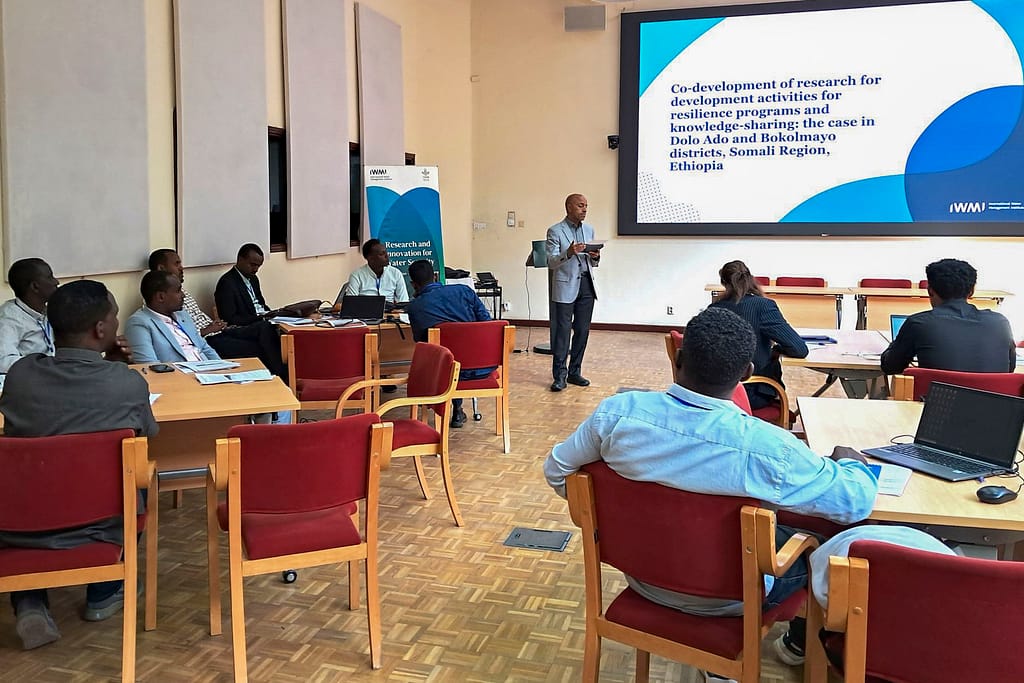
Ethiopia’s Somali Region hosts a large number of refugees and internally displaced people, primarily due to natural hazards, land degradation and conflict. These compounding challenges have significantly undermined the resilience and adaptive capacity of both refugees and host communities, putting pressure on already fragile ecosystems. In the Dolo Ado and Bokolmayo districts alone, more than 200,000 refugees are settled across five camps — outnumbering the local population.
To effectively adapt to and mitigate the impacts of natural hazards and land degradation, and to foster resilience among displaced and host populations, it is essential to anticipate future risks and implement strategic, proactive land and water management solutions. Therefore, the International Water Management Institute (IWMI), the World Food Programme (WFP), several NGOs and the Somali Regional Government have partnered to develop sustainable, visionary and response-oriented solutions to drought, flooding and ecosystem degradation in the region.
Partnerships for effective solutions
In 2023, IWMI and WFP formed a partnership, supported by the CGIAR Initiative on Fragility, Conflict and Migration (FCM), to develop resilience building strategies for fragile ecosystems in the Somali Region. Funded by the Norwegian Government and donors to the CGIAR trust fund, the FCM Initiative aims to address key challenges such as limited access to reliable data, tools and planning capacity to effectively manage climate change, land degradation and displacement risks.
Since the partnership began, IWMI and WFP have co-designed and implemented a range of research for development (R4D) activities across diverse thematic areas including: mapping and identifying nature-based solutions (NbSs) to mitigate natural hazards; addressing data and knowledge gaps in water resource management and flood mapping; and assessing local ecological knowledge and evolving livelihood strategies within refugee-hosting communities.
This collaboration has so far produced a suite of knowledge products that support climate-resilient programming in the Somali Region such as flood risk assesments and rapid hazard maps generated using multi-sensor data to guide anticipatory action; regional assessments identifying water access gaps, infrastructure vulnerabilities and technology needs; mapping of climate and water security vulnerabilities among refugee and host communities; co-designed NbSs targeting extreme weather events; and documentation of livestock transitions from pastoralism to cooperative farming as a means of informing future adaptation pathways.
These findings are currently informing practical initiatives. Elias Ibrahim, Livelihoods Program Officer at WFP, remarked on the impact of the partnership with IWMI that, “WFP is using the evidence to design context-appropriate water harvesting and irrigation systems, inform new proposals like the Mandera Triangle Climate and Resilience Project, and revise training materials to better meet field realities.”
Co-design for resilience planning
To build on these efforts and collectively determine next steps for the future collaborative work, IWMI and WFP, together with other partners, convened a two-day workshop last June in Addis Ababa that brought together nearly 30 key stakeholders from diverse sectors.
The workshop had two main objectives: to disseminate 2024 evidence on proposed NbSs, flood hazard mapping, water access and evolving livelihood strategies in refugee-hosting communities; and to co-design R4D plans in collaboration with national and regional stakeholders.
The participants highlighted that worsening weather extremes, land degradation, weak institutional frameworks (from regional to local levels) and lack of scientific evidence are intensifying water scarcity, frequent flooding, displacement and livelihood deterioration in the region. These pressures have increased the dependence on humanitarian aid and heightened competition for limited natural resources.
The evidence-based approach to develop and implement solutions, led by IWMI and WFP, was highly commended, and participants called for scaling and sustaining such efforts through continued R4D collaboration.
Looking ahead: research and development priorities
At the workshop, stakeholders collaboratively identified actionable and context-specific solutions to build resilient communities and ecosystems. Priority R4D focus areas for the next three to five years include watershed and river basin management, natural resource management and community-based initiatives, exploration of underground water sources and water quality assessments, smart irrigation technologies, early warning system assessment and revitalization, river hydrological modeling and identification of flood hotspots. Other areas of focus are stakeholder engagement and capacity building, public-private partnerships in water supply and irrigation, strengthening rural institutions and governance for sustainable development, gender dynamics and economic participation in fragile contexts, and coordinated development and humanitarian interventions in vulnerable communities.
Engineer Yahye Muktar, Senior Technical Advisor at the Somali Region Water Resources Development Bureau, emphasized: “Regional and local governance capacities must be strengthened, and humanitarian actors should reinvigorate watershed and water harvesting systems to support sustainable livelihoods in the region.”
Stakeholders also stressed the importance of enhancing the technical capacities of local professionals through inclusive education and skills training. Investment in infrastructure is seen as critical to unlocking the potential of 10,000 hectares of arable land that is essential to support the livelihoods of tens of thousands of people in the two districts.
They further advocated for the use of the R4D evidence base to develop comprehensive resilience proposals, mobilize funding and maintain strong partnerships with IWMI for continued impact monitoring, solution design and capacity building.
Demissew Eshete, Head of the Water and Energy Unit at UNHCR, said: “The future of humanitarian action and the livelihoods of vulnerable communities can be transformed for the better if anticipatory action is driven by R4D evidence, humanitarian actors coordinate effectively, irrigation agriculture is expanded, and community-led climate-resilient programs are implemented across refugee-hosting landscapes in the Somali Region.”
















